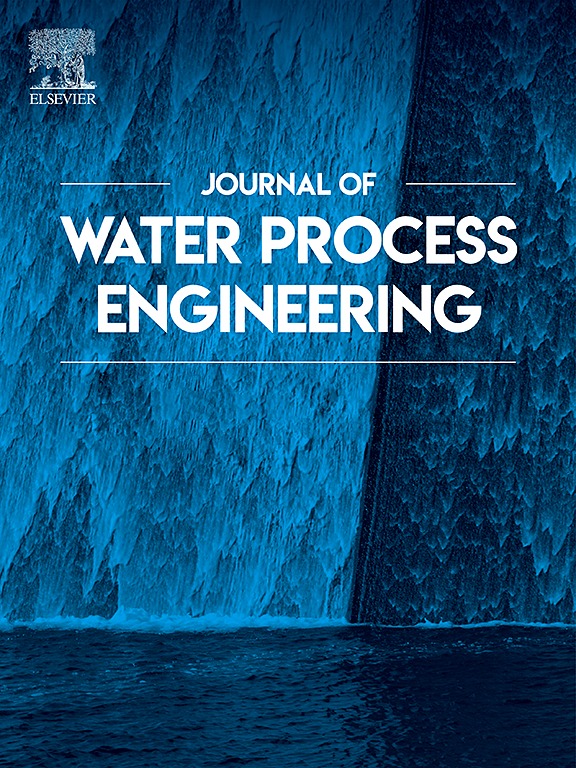Sustainable removal of boron and nitrate from agricultural irrigation water using natural sorbents: Optimization and mechanistic insights
IF 6.3
2区 工程技术
Q1 ENGINEERING, CHEMICAL
引用次数: 0
Abstract
Water contamination by boron and nitrates poses a critical challenge for agricultural sustainability, particularly in water-scarce regions. This study evaluates the effectiveness of natural zeolite, pumice, and almond shell as cost-effective sorbents for removing these contaminants from real irrigation water. Natural zeolite removed up to 98 % of boron and over 75 % of nitrate, while pumice and almond shell removed ≥50 % of nitrate. Adsorption occurred via physical or chemisorption mechanisms, depending on the sorbent. These findings highlight the potential of sustainable adsorbents to improve irrigation water quality, offering an eco-friendly alternative for agricultural water management.
利用天然吸附剂可持续去除农业灌溉水中的硼和硝酸盐:优化和机理见解
硼和硝酸盐造成的水污染对农业的可持续性构成了重大挑战,特别是在缺水地区。本研究评估了天然沸石、浮石和杏仁壳作为经济有效的吸附剂从实际灌溉水中去除这些污染物的有效性。天然沸石对硼的去除率高达98%,对硝酸盐的去除率超过75%,而浮石和杏仁壳对硝酸盐的去除率≥50%。吸附发生通过物理或化学吸附机制,取决于吸附剂。这些发现突出了可持续吸附剂改善灌溉水质的潜力,为农业用水管理提供了一种生态友好的替代方案。
本文章由计算机程序翻译,如有差异,请以英文原文为准。
求助全文
约1分钟内获得全文
求助全文
来源期刊

Journal of water process engineering
Biochemistry, Genetics and Molecular Biology-Biotechnology
CiteScore
10.70
自引率
8.60%
发文量
846
审稿时长
24 days
期刊介绍:
The Journal of Water Process Engineering aims to publish refereed, high-quality research papers with significant novelty and impact in all areas of the engineering of water and wastewater processing . Papers on advanced and novel treatment processes and technologies are particularly welcome. The Journal considers papers in areas such as nanotechnology and biotechnology applications in water, novel oxidation and separation processes, membrane processes (except those for desalination) , catalytic processes for the removal of water contaminants, sustainable processes, water reuse and recycling, water use and wastewater minimization, integrated/hybrid technology, process modeling of water treatment and novel treatment processes. Submissions on the subject of adsorbents, including standard measurements of adsorption kinetics and equilibrium will only be considered if there is a genuine case for novelty and contribution, for example highly novel, sustainable adsorbents and their use: papers on activated carbon-type materials derived from natural matter, or surfactant-modified clays and related minerals, would not fulfil this criterion. The Journal particularly welcomes contributions involving environmentally, economically and socially sustainable technology for water treatment, including those which are energy-efficient, with minimal or no chemical consumption, and capable of water recycling and reuse that minimizes the direct disposal of wastewater to the aquatic environment. Papers that describe novel ideas for solving issues related to water quality and availability are also welcome, as are those that show the transfer of techniques from other disciplines. The Journal will consider papers dealing with processes for various water matrices including drinking water (except desalination), domestic, urban and industrial wastewaters, in addition to their residues. It is expected that the journal will be of particular relevance to chemical and process engineers working in the field. The Journal welcomes Full Text papers, Short Communications, State-of-the-Art Reviews and Letters to Editors and Case Studies
 求助内容:
求助内容: 应助结果提醒方式:
应助结果提醒方式:


